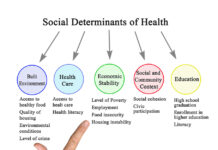A new study, published in American Journal of Preventive Medicine, investigates the relationship between sustained economic hardship and cognitive function. The results of the prospective cohort study that analyzed data from almost 3,400 individuals show that individuals who experience long-term poverty perform worse on cognitive tasks than their peers who have never experienced poverty.
“Monitoring changes in income and financial difficulty over an extended period of time and how these influence cognitive health is of great public health interest,” said Dr. Adina Zeki Al Hazzouri in a recent press release. Dr. Zeki Al Hazzouri, the lead investigator of the study, is a faculty member in the Department of Public Health Sciences at the University of Miami.

Living in economic hardship has been tied to poorer health outcomes and previous studies have provided evidence that low economic status impacts cognition in older adults. However, the authors of the current study note that previous research did not assess a diverse range of factors to measure economic hardship over a sustained period of time, and there have been no studies assessing the impacts of poverty on cognition in middle age.
Therefore the researchers designed a study “to use repeated data of various economic parameters to examine the associations of sustained poverty and perceived financial difficulty on cognitive function in a cohort of young to middle-aged black and white adults.” The researchers collected data from the Coronary Artery Risk Development in Young Adults (CARDIA) study.
They assessed economic hardship using two variables that were measured at least six times over two decades. The first was sustained poverty, defined as the percentage of time that income was below 200% of the federal poverty level. For example, in 2010 a four-person household would be considered living in poverty if their household income was below $44,630. The second variable was sustained perceived financial difficulty, measured by participants reporting whether they experienced difficulty paying for basic needs (e.g., food, heat). In 2010, at the end of the 25-year study, participants took a battery of cognitive tests to assess cognitive functioning.
Dr. Zeki Al Hazzouri and colleagues report that scores for processing speed and executive function were correlated with both economic hardship variables, with individuals who experienced sustained economic hardship receiving lower cognitive scores. “The findings reveal a clear graded relationship such that cognitive performance, processing speed in particular, was worse with further cumulative exposure to economic adversity,” state the researchers. The authors conclude that “economic hardship may be… an important contributor to clinically significant cognitive deficit and premature aging among economically disadvantaged individuals.”
The authors acknowledge the limitation that they did not have access to baseline cognitive data, and therefore could not rule out reverse causation, meaning they could not conclude that economic hardship caused impairment in cognitive functioning. However, the authors did conduct additional analyses that restricted participants to those with a healthy cardiovascular profile and high education level, and did not find significantly different results. The authors suggest that “the findings are likely a mix of the effects of economic hardship on cognition and reverse causation (i.e., cognition influencing trajectories of economic hardship).”
The researchers note, “It is becoming increasingly clear that maintaining cognitive health is a lifelong process with a long preclinical period” as their findings bolster existing evidence that there is a relationship between earlier socioeconomic status and later cognitive functioning. The study was conducted during a period that included times of economic growth and recession. Therefore, it “provides a unique opportunity to reflect upon how such economic instability influences health,” state the researchers. The study also demonstrates that both an objective measure of poverty (i.e., income) and subjective measure (i.e., perceived financial difficulty) are strongly correlated with cognitive ability.
“Maintaining cognitive abilities is a key component of health and daily quality of life,” and therefore it is essential for researchers, providers, and policy makers to better understand how economic hardship and other factors impact cognition.
****
Zeki Al Hazzouri, A., Elfassy, T., Sidney, S., Jacobs, D., Pérez Stable, E. J., & Yaffe, K. (2016). Sustained economic hardship and cognitive function: The Coronary Artery Risk Development in Young Adults study. American Journal of Preventive Medicine. Advance online publication. http://dx.doi.org/10.1016/j.amepre.2016.08.009 (Abstract)















I was raised in a privileged, professional environment and that was the world I knew, so I took it for granted. At age 40, following a successful career and then graduate school, I became disabled (from psych drugs). I lived in San Francisco, one of the most expensive cities in the world, and suddenly found myself living hand-to-mouth, and seriously sweated out being able to make rent month to month, in a city well-known for its homeless population. This lasted for a good long while, first because of the disability, and then, thanks to very sabotaging stigma which would not allow me to move forward.
Fortunately, I freed myself from the cult-aspects of the system, and I’m back in action now, working and producing, but the system bankrupted me. This was a whole new experience of life for me.
What was compromised was my ability to focus because I was scared to death. My finances were drained, and so was my energy, so the prospect of making money doing anything was grim at that time. And I had lots and lots of student loans, on top of it all.
In addition, this was all new to me. I was not aware of my survival skills, not sure I had it in me to deal with this. So constant worry about where the next meal was coming from and will I have a roof over my head tomorrow would, indeed, interfere with thought functions because these are constant worries. Even when we’re not consciously thinking about them, they lurk inside there, and take up tons of space, both emotionally and mentally. Hardly room for much else. Hard to feel any peace, joy, or love at all when constantly worried about basic survival.
The other big stressor is that people LOVE to brag about their money, and flaunt it. Some people really go out of their way to try to evoke jealousy from others, as a way of control, and also as a way to boost their own ego. Society, in general, shames those with no money, so it is very spirit-wounding, and quite easy to slip into feelings of unworthiness, which can be devastating, especially as an adult. That’s where marginalization and other forms of social bullying occur.
While it is necessary in our world for survival, we put so much value on how much money we have that it has come to determine our worth in society, and also the level of respect people receive. Why should money (as opposed to, say, integrity, kindness, and humility) determine respect? That is tragic, and it leads to madness, on all levels, because it is madness, in and of itself. While it is a very powerful belief in today’s world, I still think it’s completely delusional.
My needs are basic now, and my life is simple. I’ve never been more at peace. The money game is yet another tool of control, brainwashing, and manipulation. I think rich people can experience way more stress than poor people, in many instances. So really, it is a matter or perspective, and the social perspective regarding money really sucks, in my estimation. That’s what I learned going from financial stability to living on disability to feeling my abundance by accommodating simple needs. I don’t have a lot but I am definitely not in lack, because I am extremely grateful for everything I do have, and that feels like the world to me. Amazing and totally enlightening journey that was–mind-bending and life-changing, too.
All in all, it was core healing from some very delusional beliefs about money, power, and self-worth, particularly perpetuated in the media, which is brainwashing, pure and simple. That was some of the most freeing and relieving healing I’d ever done.
In a world defined by the division of those who have and those who do not, who is going to suffer?
Report comment